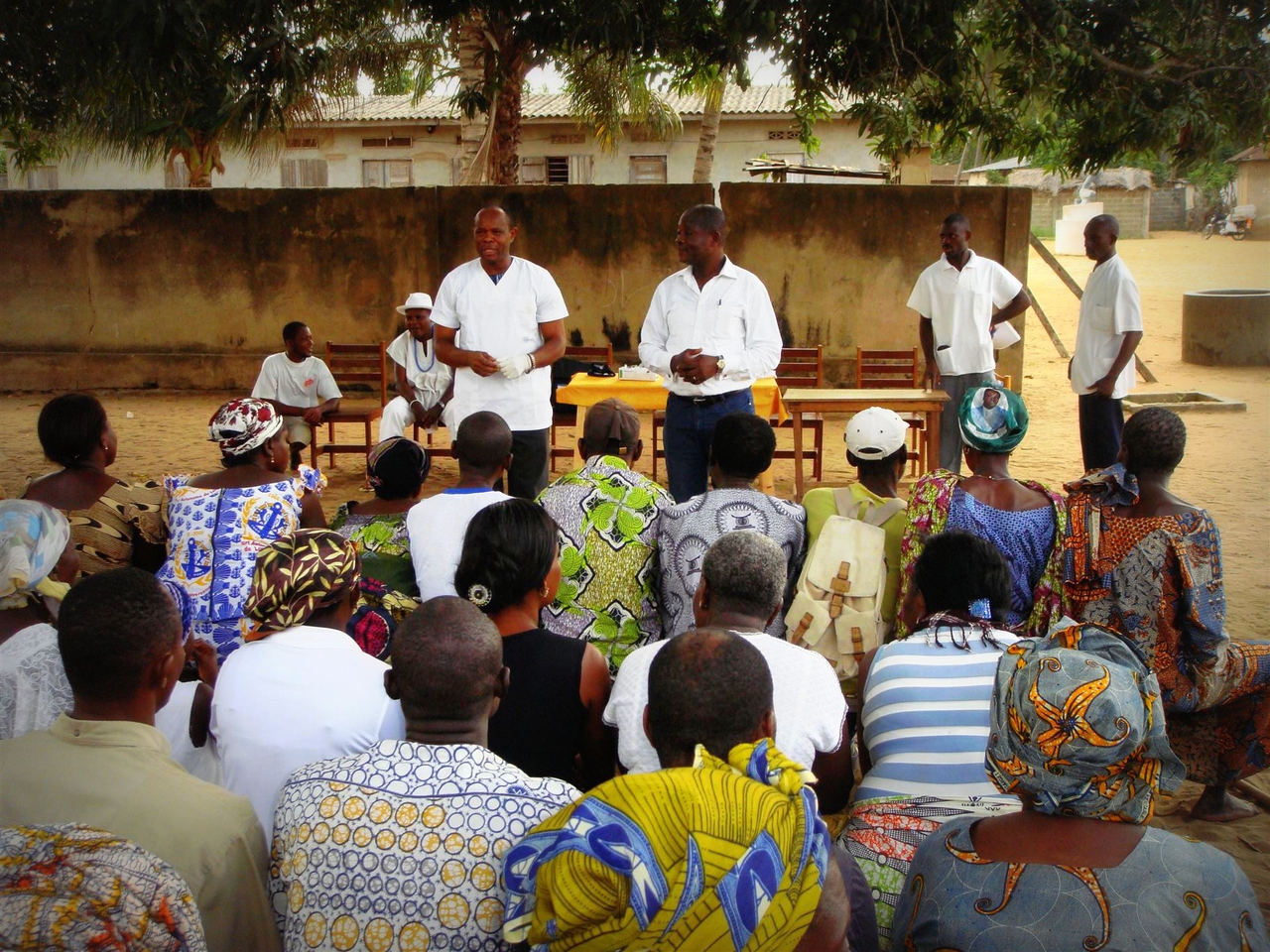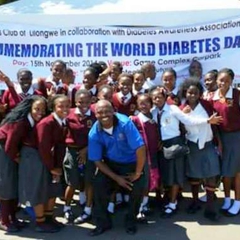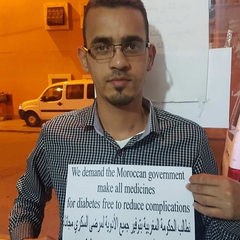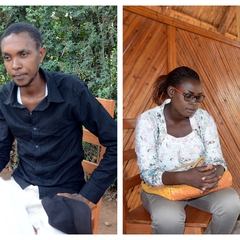
Interview: Diabetes in West Africa
28 Jul 2014, 6:01 p.m. in Global Stories, Interviews by Elizabeth Pfiester
Over a year ago I received an email from George, who has been doing some difficult but very important work with diabetes in West Africa. Since our first communication we have been in touch supporting each other, and it is about time I shared George’s story. George Ezeani lives in Germany but is originally from Africa himself, born in Nigeria. He likes to say that he has no borders, which I take to mean that he feels a sense of loyalty to many different people around the world, regardless of where they come from. After learning and understanding more about diabetes, George realized that there was a huge lack of understanding and awareness among the West African population.
I asked George some questions about the work he does to try to get a picture of life with diabetes in West Africa and the diabetic populations he works with. George talks about how he got involved in diabetes work, why it is important, and he also highlights a lot of the huge challenges faced by people who are trying to address the issues and find solutions to this growing, global burden. We need more people like George – people who will speak openly about the obstacles to diabetes solutions so that local communities and global advocates can speak out and push governments for better resources and care for diabetes, which everyone deserves.
Can you tell me a bit about yourself and how you came to be involved in diabetes work?
My name is George Ezeani. I am a Biomedical Lab Technician and a German-Qualified Diabetes Educator (DDG). I live in Germany. Until I migrated to Germany, I was as ignorant as so many people still are today, about Diabetes. I got really involved with diabetes while I was working in Research Centre of the Frankfurt University Teaching Hospital in Germany. I realized and came to believe that most deaths are not as a result of Voodoo but caused by diabetes and its complications. I was able to convince my boss to grant me a 1-year holiday in order to go back home and tell my people about this chronic disease called Diabetes. This is how it all started. Now I do not know how to get out of it.
Like a lot of people that work around the globe on diabetes-related issues, George does not have adequate time or resources to support all the people living with diabetes that he wants to. He continues his work because of the great need for it and because of his passion for the cause.
Tell us about the organization you started (Diabetes Care West Africa) in Germany and the team who helped you do work for people living with diabetes in West Africa.
From 2006 to 2010 I had motivation and joy that I was doing something good so I decided to invest all my savings in the diabetes program. I eventually noticed that I could no longer carry on alone, and I was advised to form an NGO and look for sponsors and supporters. Getting people to form the NGO was difficult; people are often not able or willing to make sacrifices or take responsibility attached to forming such an NGO. However, I managed to form one in 2011.
Our basic objective is “…creation of awareness, early detection of diabetes, assisting and supporting as much as possible people with this chronic disease.” We use a random test method to screen people for diabetes and take irregular results to the lab for further testing and confirmation. We also use a Glucose tolerance test method as well as Glycated haemoglobin test (A1c) method.
We had our first Togo Diabetes Campaign Tour in May 2012. It was a success story for both sides: the Germans, who for the first time in their life visited Africa, and the Africans, who for the first time met people who really care about their diabetes situation.
What are some of the obstacles you found for people with diabetes in West Africa?
Diabetes is a global problem and that we know, but poverty is a very big obstacle for people with diabetes in West Africa, which makes life with diabetes even more difficult. Until the people in power around the world are ready to look at Diabetes as a serious issue, Diabetes will be growing stronger every minute. The West African Governments equally do not show signs of readiness to accept help from people and NGOs. For example, after our Diabetes Campaign Tour, we realized that the first thing to do is to train Doctors, Nurses and medical Assistants on Diabetes Therapy. We offered this training for free to different countries. We are still waiting for response.
On that same note, what do you think is the most important thing to focus on for people living with diabetes in Togo where you go every year to offer support?
Diabetes is a chronic disease. If someone has diabetes, they have it for life. Personally I am not diabetic and nobody in my family has diabetes, but someone once said “He who feels it, knows the pain.” After meeting a young boy named Happy in his 20s with Type 1 diabetes, I became really afraid of the condition. Diabetes, especially Type 1 diabetes, is really not for poor people. This boy – and people like him, along with other insulin-dependent children – have no chance without external help because the sickness is so expensive.
Aside from the issue of affordability, I think it would be extremely important to lay more emphasis on prevention of diabetes (in all forms). Diabetes Foot syndrome, for example, is costing Germany’s health Insurance system a lot. I do not think, as of now, that any African country can afford the type of care that Germany offers.
The early stage Type 2 patients probably have the chance to turn their condition around if they change their lifestyle as well as taking on activities/sports as part of their life. It is on this point that our association decided to focus on diet and exercise therapy. We rented a hall in Lomé, Togo where we led some activity and proved to people that only 15 minutes of active movement can positively affect your blood sugar level.
Why do you continue to return to West Africa year after year to do what you do?
This is a good question because my work in Africa is not obligatory. My initial plan was to set up a forum in each ECOWAS country, where people with and without diabetes could go, meet and learn from each other and share experiences as well. I would then support them from Germany. I have found this plan is difficult to attain in Togo. This is why I keep on going there to support them. Below you can see pictures from some of the screenings we have carried out there.
If you could share one main message in regards to diabetes in Africa with governments or anyone reading this, what would you say?
We are all aware of the fact that diabetes is on the rise. We need more diabetes educators. I read somewhere that Nigeria for example has only two qualified diabetes educators. That is nothing compared to their more or less 5 million diabetes patients. Governments in Africa should accept offers from accredited Diabetes centres abroad that offer diabetes training for trainers. We are still ready to offer such free training. Besides, we have some supplies and if someone needs them and can afford the cost of postage, we will send them to the person.
Please share any other thoughts you have about the work you do for diabetes in West Africa and around the globe.
It is funny and also interesting to know that if Diabetes would be a country, it would be the 3rd populous country in the world. I am glad that our Association is gaining more recognition in Germany and in West Africa. We know that diabetes medications like insulin and test strips are expensive because the patent holders of these products do not care about the diabetic patients, they only care about the profits they make. On the other hand, diabetes patients should be ready to participate and comply to the diabetes therapy rules and suggestions for a healthier life.
I can still remember paying for and giving a patient some Type 2 diabetes medication. I came to test that person’s blood sugar, they had taken the medicine and gone. Nevertheless, we do our best to assist anybody who needs our assistance as long as we have stock.
Thanks, George, for sharing so much with us about what you do and about the challenges you have faced. We applaud you for your work and we know that you are touching lives with the vital work you do.
You can learn more about George’s organization by visiting www.diabetes-care-west-africa.com where you can find contact information for Geroge and the team.








